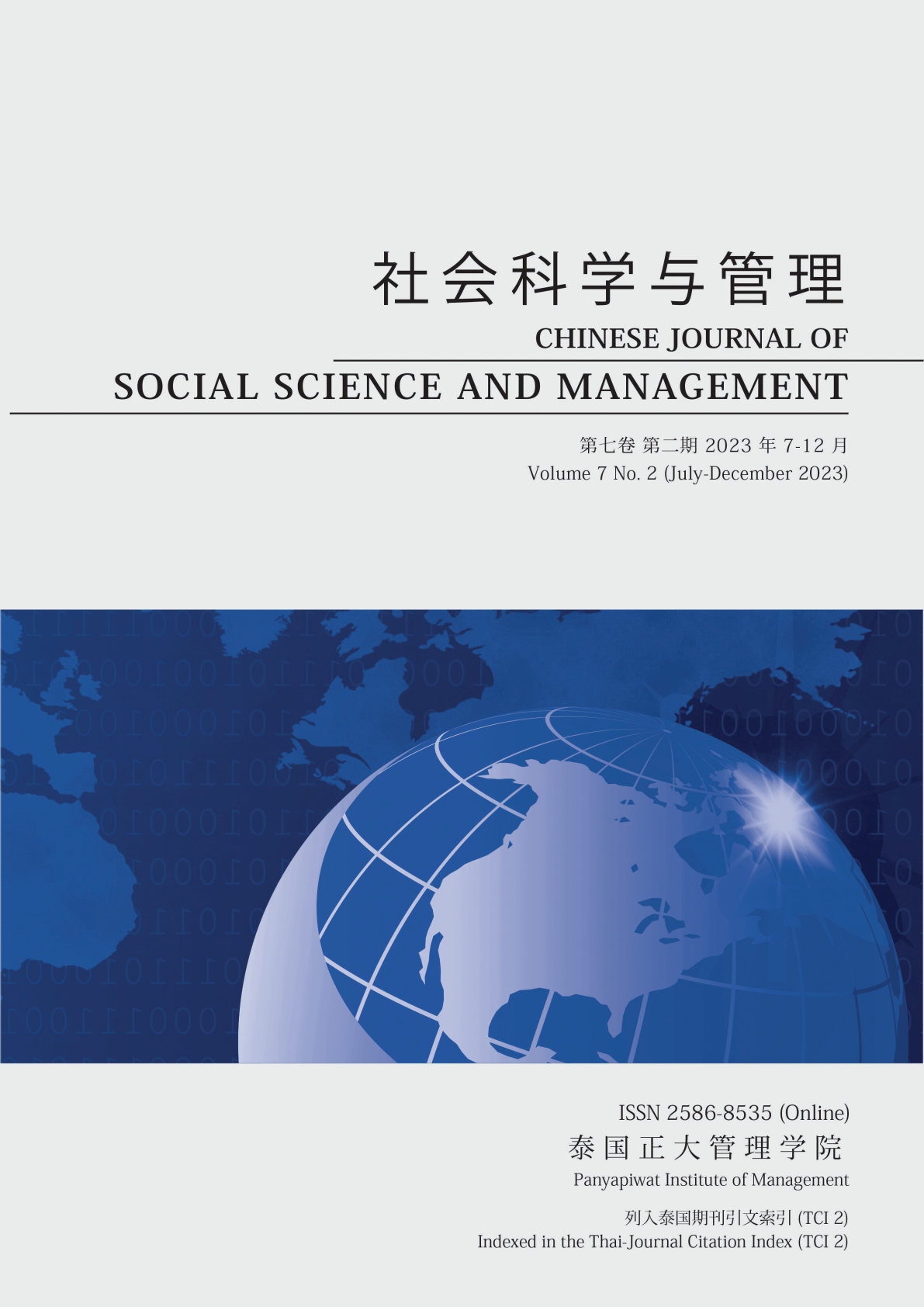THE NEGATIVE EFFECTS OF WORKPLACE NEGATIVE GOSSIP ON THE TARGET EMPLOYEES
Main Article Content
Abstract
As a category of workplace violence, workplace negative gossip usually has three participants: Gossip senders, gossip receivers and gossip targets. Previous studies conducted on workplace negative gossip have mostly discussed its impact on gossip senders but neglected its impact on target employees. Based on the cognitive-affective personality system theory, this study explores the effects of workplace negative gossip on the helping behaviors of target employees. The results from the questionnaire survey of 237 employees from central China showed that workplace negative gossip has a significantly negative relationship with employees’ helping behavior and employees’ perceived insider status and these negative effects play a mediating role in the relationship between workplace negative gossip and helping behavior. This study has not only enriched the impact of workplace negative gossip and expanded the research perspective but can also help organizations recognize the negative effects of workplace negative gossip and provides some insights into the methods to control workplace negative gossip.
Article Details

This work is licensed under a Creative Commons Attribution-NonCommercial-NoDerivatives 4.0 International License.
Chinese Journal of Social Science and Management Editorial Division
The Office of Research and Development, Panyapiwat Institute of Management
85/1 Moo 2, Chaengwattana Rd., Bang Talat, Pakkred, Nonthaburi 11120, Thailand
Tel. 02 855 01048 E-mail: cjssm@pim.ac.th
References
Aquino, K., & Thau, S. (2009). Workplace victimization: Aggression from the target’s perspective. Annual Review of Psychology, 60, 717-741.
Baumeister, R. F., Zhang, L., & Vohs, K. D. (2004). Gossip as cultural learning. Review of General Psychology, 8(2), 111-121.
Brady, D. L., Brown, D. J., & Liang, L. H. (2017). Moving beyond assumptions of deviance: The reconceptualization and measurement of workplace gossip. Journal of Applied Psychology, 102(1), 1-25.
Chandra, G., & Robinson, S. L. (2009, August). They’ re talking about me again: The negative impact of being the target of gossip [Tape recording]. Paper presented at the 2009 Academy of Management Annual Meeting, Chicago, IL, USA.
Du, H. B., & Zhu, Q. L. (2018). The effect of workplace negative gossip on scientific and technical personnel creativity. Journal of Psychological Science, 41(1), 125-131.
Du, H. B., Zhu, Q. L., & Liu, C. H. (2019). The effect of workplace negative gossip on proactive behavior: A moderated mediation model. Management Review, 31(2), 190-199.
Duffy, M. K., Ganster, D. C., & Pagon, M. (2002). Social undermining in the workplace. Academy of Management Journal, 45(2), 331-351.
Dunbar, R. I. (2004). Gossip in evolutionary perspective. Review of General Psychology, 8(2), 100-110.
Dunbar, R. I., Marriott, A., & Duncan, N. D. (1997). Human conversational behavior. Human Nature, 8(3), 231-246.
Edwards, J. R., & Lambert, L. S. (2007). Methods for integrating moderation and mediation: A general analytical framework using moderated path analysis. Psychological Methods, 12(1), 1-22.
Ellwardt, L., Wittek, R., & Wielers, R. (2012). Talking about the boss: Effects of generalized and interpersonal trust on workplace gossip. Group & Organization Management, 37(4), 521-549.
Emler, N. (1994). Gossip, reputation, and social adaptation. In R. F. Goodman, & A. Ben-Ze’ev (Eds.), Good gossip (pp. 117-138). University Press of Kansas.
Farley, S. D., Timme, D. R., & Hart, J. W. (2010). On coffee talk and break-room chatter: Perceptions of women who gossip in the workplace. The Journal of Social Psychology, 150(4), 361-368.
Foster, E. K. (2004). Research on gossip: Taxonomy, methods, and future directions. Review of General Psychology, 8(2), 78-99.
Kniffin, K. M., & Wilson, D. S. (2005). Utilities of gossip across organizational levels. Human-Nature, 16(3), 278-292.
Lee, H. W., Bradburn, J., Johnson, R. E., Lin, S. H. J., & Chang, C. H. D. (2019). The benefits of receiving gratitude for helpers: A daily investigation of proactive and reactive helping at work. Journal of Applied Psychology, 104(2), 197-213.
Liu, C., Spector, P. E., & Shi, L. (2007). Cross national job stress: A quantitative and qualitative study. Journal of Organizational Behavior, 28(2), 209-239.
Mayer, R. C., & Gavin, M. B. (2005). Trust in management and performance: Who minds the shop while the employees watch the boss? Academy of Management Journal, 48(5), 874-888.
McAndrew, F. T., Bell, E. K., & Garcia, C. M. (2007). Who do we tell and whom do we tell on? Gossip as a strategy for status enhancement. Journal of Applied Social Psychology, 37(7), 1562-1577.
Michelson, G., & Mouly, S. (2000). Rumour and gossip in organisations: A conceptual study. Management Decision, 38(5), 339-346.
Mischel, W. (1973). Toward a cognitive social learning reconceptualization of personality. Psychological Review, 80(4), 252-283.
Noon, M., & Delbridge, R. (1993). News from behind my hand: Gossip in organizations. Organization Studies, 14(1), 23-36.
Podsakoff, P. M., MacKenzie, S. B., Lee, J. Y., & Podsakoff, N. P. (2003). Common method biases in behavioral research: A critical review of the literature and recommended remedies. Journal of Applied Psychology, 88(5), 879-903.
Schwarz, N., & Clore, G. L. (2003). Mood as information: 20 years later. Psychological Inquiry, 14(3-4), 296-303.
Stamper, C. L., & Masterson, S. S. (2002). Insider or outsider? How employee perceptions of insider status affect their work behavior. Journal of Organizational Behavior, 23(8), 875-894.
Stinson, D. A., Logel, C., Zanna, M. P., Holmes, J. G., Cameron, J. J., Wood, J. V., & Spencer, S. J. (2008). The cost of lower self-esteem: Testing a self-and social-bonds model of health. Journal of Personality and Social Psychology, 94(3), 412-428.
Waddington, K., & Fletcher, C. (2005). Gossip and emotion in nursing and health care organizations. Journal of Health Organization and Management, 19, 378-394.
Watson, D., Clark, L. A., & Tellegen, A. (1988). Development and validation of brief measures of positive and negative affect: The PANAS scales. Journal of Personality and Social Psychology, 54(6), 1063-1070.
Wu, L. Z., Birtch, T. A., Chiang, F. F., & Zhang, H. (2018). Perceptions of negative workplace gossip: A self-consistency theory framework. Journal of Management, 44(5), 1873-1898.


